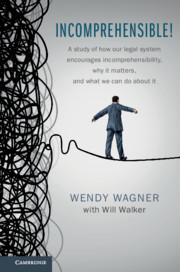Description
Incomprehensible!
A Study of How Our Legal System Encourages Incomprehensibility, Why It Matters, and What We Can Do About It
Authors: Wagner Wendy, Walker Will
Explains how the law often encourages actors to be incomprehensible in ways that actually undermine the purpose of the laws themselves.
Language: English
Subject for Incomprehensible!:
Approximative price 39.35 €
In Print (Delivery period: 14 days).
Add to cart
Incomprehensible!
Publication date: 07-2019
356 p. · 15.2x22.8 cm · Paperback
Publication date: 07-2019
356 p. · 15.2x22.8 cm · Paperback
Approximative price 99.06 €
In Print (Delivery period: 14 days).
Add to cart
Incomprehensible!
Publication date: 07-2019
356 p. · 15.7x23.5 cm · Hardback
Publication date: 07-2019
356 p. · 15.7x23.5 cm · Hardback
Description
/li>Contents
/li>Biography
/li>
The legal system is awash with excessive and incomprehensible information. Yet many of us assume that the unrelenting torrent of information pouring into various legal programs is both inevitable and unstoppable. We have become complacent; but it does not have to be this way. Incomprehensible! argues that surrendering to incomprehensibility is a bad mistake. Drawing together evidence from diverse fields such as consumer protection, financial regulation, patents, chemical control, and administrative and legislative processes, this book identifies a number of important legal programs that are built on the foundational assumption that 'more information is better'. Each of these legal processes have been designed in ways that ignore the imperative of meaningful communication. To rectify this systemic problem, the law must be re-designed to pay careful attention to the problem of incomprehensibility.
Acknowledgments; Part I. The Concept: 1. Introduction; 2. Modeling comprehension asymmetries; 3. The implications of comprehension asymmetries for the law; Part II. Application: 4. Comprehension asymmetries and consumer protection law; 5A. Comprehension asymmetries in financial regulation; 5B. Comprehension asymmetries in the law of patents; 5C. Comprehension asymmetries in chemical regulation; 6. Comprehension asymmetries in administrative process; 7. Comprehension asymmetries in legislative processes; Part III. System-Wide Reform: 8. A blueprint for reform; Bibliography.
Wendy Wagner is Richard Dale Endowed Chair in Law at The University of Texas at Austin, School of Law. She is the author of two books: Bending Science: How Special Interests Corrupt Public Health Research with Tom McGarity (2008), which received the Hamilton Grand Prize for the best book published at University of Texas in 2009, and Rescuing Science from Politics: Regulation and the Distortion of Scientific Research with Rena Steinzor (Cambridge, 2006).
Will Walker is a freelance writer based in Cambridge, Massachusetts. He has a B.A. in English from Williams College, a Masters in Philosophy of Religion from Harvard Divinity School, and is currently pursuing a law degree at Harvard Law School.
Will Walker is a freelance writer based in Cambridge, Massachusetts. He has a B.A. in English from Williams College, a Masters in Philosophy of Religion from Harvard Divinity School, and is currently pursuing a law degree at Harvard Law School.
© 2024 LAVOISIER S.A.S.

